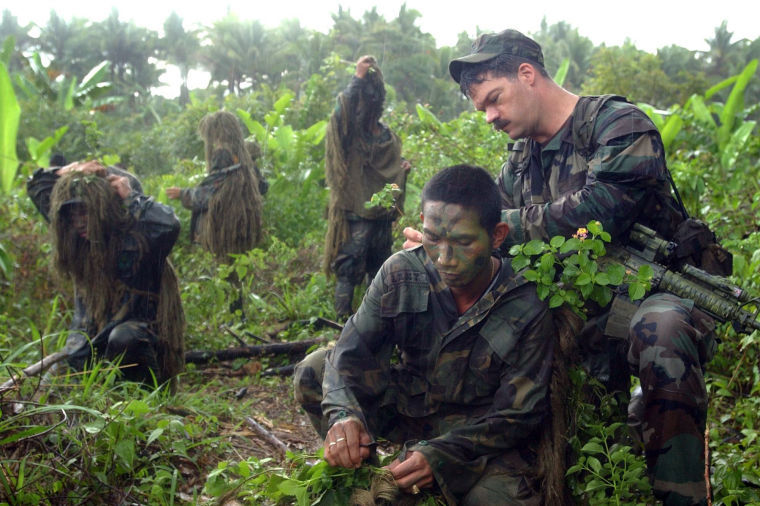A helpful hug
U.S. Army Special Forces Sgt. First Class Ed Roberts (right) prepares Filipino Pvt. First Class Armando Ramos for a reconnaissance mission in the jungles of Basilan Island in the southern Philippines, April 22, 2002.
May 2, 2014
While events in Ukraine have temporarily caught the world’s attention, a cold wind blows through the Pacific Ring. And although the annexation of Crimea remains significant, it pales in comparison to the possible catastrophe in Asia.
Of course, this hasn’t gone unnoticed in the highest levels of American government. If you read my column about China that printed Wednesday, you should already know the extent to which their region is seeing increased militarization.
If you haven’t, let me bring you up to speed with a quick recap: The People’s Republic is getting ready to arm their submarines with long range nuclear missiles; they have the second highest military expenditure in the world, even higher than Russia; they are gaining access to U.S. technologies through espionage in an effort to modernize their armed forces; and they have been challenging the territorial integrity of their neighbors and U.S. neighbors more and more frequently.
I have already advocated taking a softer approach to China than previous administrations took with the former Soviet Union, but don’t take that as a position of weakness. Obama’s pivot to the east is not only about building closer economic ties, but also flexing American muscle as a deterrent to an antagonistic Chinese government.
IHS Jane’s, a defense analysis company, has recently reported on our leadership’s numerous strategies to contain the sphere of Chinese influence to their own sovereign territory, including a new 10-year deal for American soldiers to utilize Filipino military bases, an unwavering commitment to Japan regarding its administration of the Senkaku Islands, and continued cooperation with our South Korean counterparts.
To clarify, the basing agreement with the Philippines does not allow for permanent stationing of U.S. troops; it works on the principle that Americans will provide training to Filipino soldiers as they rotate through the region.
Ben Rhodes, deputy U.S. National Security adviser for Strategic Communications, has gone on record saying, “This isn’t an agreement designed to resolve maritime disputes.” Evan Medeiros, senior director for Asian affairs at the U.S. National Security Council said, “We’re not doing this because of China,” according to a different report from IHS Jane’s.
Sure it isn’t, and we’re only placing support units in Poland for fun. While the United States must request consent from the Philippines government for all activities it performs there, keep in mind that they have fought along U.S. troops in the past and continue to do so today.
Terrorist attacks across the Philippines have recently rocked the country, and in one incident a band of approximately 100 rebels simultaneously raided five different facilities at the same time, burning at least 20 vehicles, according to The Philippine Star.
This attack came only days after a similarly-sized group attacked a Chinese mining company in the area. When they’re not fighting their own government, terrorist groups remain keen on fighting those they see as outside aggressors.
Still, American influence extends past the Philippines in a strategy that looks to contain mainland China from all sides.
IHS Jane’s has reported that Taiwan will be undertaking new live-fire exercises this year utilizing U.S. manufactured Apache attack helicopters and anti-submarine aircraft. Not only that, they are for the first time simulating an aircraft carrier attack.
This should come as no surprise because the Chinese have been building up their submarine fleet rapidly and acquired their first carrier just two years ago. Coincidentally, that’s when the U.S. and Filipino basing talks began.
On April 10, Taiwan conducted their largest military exercise in 15 years aimed at a simulated retaking of the Spratly Islands in the case that it became ‘occupied by invading forces.’
If you consider the extremely strained relationship between Taiwan and China, it should be obvious who the aggressor in this scenario is.
Secretary of Defense Chuck Hagel and President Obama have both reiterated their intent on defending Japanese sovereignty should China make any efforts to steal the Senkaku Islands. If Hindu nationalist Narendra Modi wins the prime ministerial election in India, he will certainly take a more hardline approach to defending their border from the Chinese incursions that have come to characterize the region.
At a time when China’s global influence is growing, it may appear to them that the world is shrinking.
Like a SWAT team trying to contain someone holed up in a house with a gun, we’ve got them surrounded.
The United States needs to play nice with China — economically. Asserting our influence isn’t provocation. It’s a reminder of our commitment to the values of democracy, freedom, and security world-wide.
It’s not about intimidation. It’s a helpful hug.
– Bryan Allen is a junior political science major from Puyallup. He can be contacted at 335-2290 or by [email protected]. The opinions expressed in this column are not necessarily those of the staff of The Daily Evergreen or those of Student Publications.









